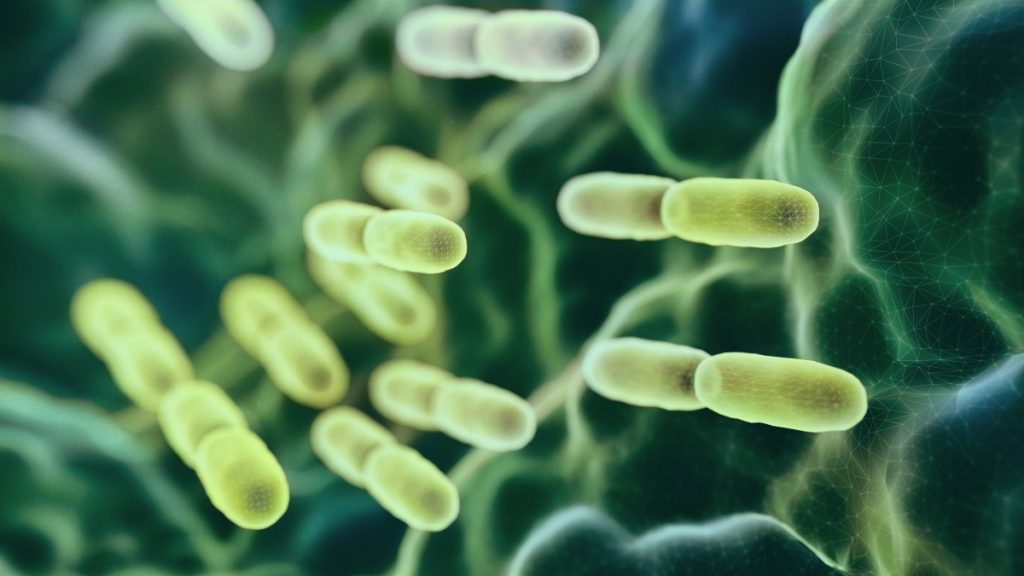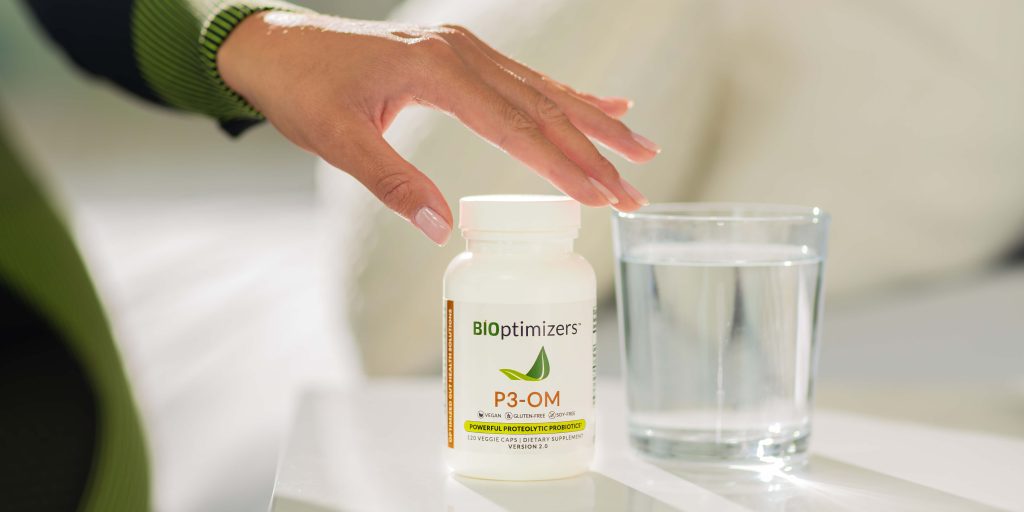Digestive Enzymes vs. Probiotics

Digestive enzymes and probiotics are two major players in the digestion game. Understanding how they function and when to use them can create a healthy digestive environment.

In this article, we’ll dive into their benefits, considerations, and the best times to take them for optimal digestive health.
Digestive Enzymes vs. Probiotics: What’s the Difference?
While both digestive enzymes and probiotics support digestion, they do so differently.
- Digestive enzymes are proteins that help break down food in the stomach and small intestines.
- Probiotics are microorganisms that mostly inhabit the large intestine, although they are crucial in maintaining a balanced and healthy environment for the entire body. Some probiotics produce digestive enzymes.
Insufficient levels of either can negatively impact overall gut health and digestion. Having enough of both helps create an optimal environment in your digestive system and supports your well-being.
At BIOptimizers, we believe that taking both together can provide synergistic benefits beyond taking either alone.

What are Digestive Enzymes?
Digestive enzymes are the proteins that help you break down the food that you eat into nutrients. Different enzymes exist to digest different food materials, such as lipase for fats, proteases for proteins, and amylase for starches. You need enough of them for optimal digestion health and nutrient absorption.
The pancreas and specific cells in the walls of your gut produce digestive enzymes. The enzymes are then typically mixed with digestive juices in the stomach and small intestine. However, there are situations where a digestive enzyme supplement might be necessary for additional support. We’ll get into these in a moment.
To learn more about digestive enzymes, check out our article about the types of enzymes and why you may need them. This article shares how to choose digestive enzyme supplements.
What are Probiotics?
Probiotics, commonly called “good bacteria,” are living microorganisms necessary for thriving gut health. They offer many health benefits, including:
- Occupying space to keep suboptimal gut bacteria in check
- Contributing to balanced and robust immune functions
- Playing a supporting role in digestion and nutrient absorption
- Promoting digestive regularity
- Promoting a healthy gut barrier
They may even contribute to a more positive mood and better sleep.
You can get these beneficial microorganisms by eating foods containing probiotics or by taking probiotics supplements.
Check out our extensive collection of articles on probiotics on our blog.
When comparing digestive enzymes and probiotics, know that digestive enzymes help digest food, and that’s essentially it. Some digestive enzymes are systemic enzymes that can be absorbed into the bloodstream and help break down cellular debris. On the other hand, probiotics have a wide array of health benefits. Different strains of probiotics address various health issues.
Digestive Enzymes vs. Probiotics: Which Should I Take?

Signs You Might Benefit from Digestive Enzymes or Probiotics
So, where do you even begin? Let’s start with symptoms indicating a need for digestive enzymes or probiotics.
Indicators you might want to start taking digestive enzymes more so than probiotics:
- Poor digestion
- Your stomach feels heavy after eating
- Floating stool, indicating poor fat digestion
- Abdominal discomfort
- Taking supplements but you’re not absorbing them
- Food sensitivities, intolerances, or allergies due to suboptimal digestion
- You tend to eat under stress or in a hurry
- Regularly perform intense physical activity
- You have to eat a lot to gain weight
- When you get stomach discomfort from eating a lot on occasions, such as holiday celebrations
- Certain foods, such as gluten, dairy, or red meat cause problems for you, whether it’s digestive problems or other symptoms. In this case, it may be beneficial to take enzymes specific for such foods, although avoiding the trigger foods is best. If you’re Celiac or severely gluten-sensitive, enzymes won’t be a full pass for full plates of pasta or bread.
Indicators you might want to start taking probiotics:
- Indigestion
- Bloating
- Irregular bowel movements
- Occasional diarrhea or constipation
- Gut dysbiosis – an imbalance of good and bad gut bacteria
- After a recent course of antibiotics
- Poor sleep quality
- Poor mood
- Suboptimal immune function or balance
- Suboptimal blood tests from your annual checkups
There is a lot of overlap between why you might want to start taking one or both. Let’s get into some specific situations that may concern you.
Are Digestive Enzymes or Probiotics Better for Bloating and Gas?
The effectiveness of digestive enzymes or probiotics in alleviating bloating and gas comes down to the underlying cause. Explore the causes of gas in bloating in this article. Let’s briefly explore both options.
Digestive Enzymes
If bloating and gas are due to difficulty digesting certain foods, such as carbohydrates or fats, digestive enzymes may assist in the breakdown and absorption, potentially reducing bloating. Full-spectrum digestive enzymes, like Masszymes, are a comprehensive blend of enzymes designed to break down different macronutrients like protein, carbs, and fat in your meals.
For more detailed information, check out this article on digestive enzymes for bloating and gas.
Probiotics
Probiotics may be beneficial if bloating is associated with an imbalance in gut bacteria.
They can aid in maintaining a balanced gut microbiota, potentially reducing gas production and bloating or helping your gut move more smoothly. Probiotics like P3-OM produce substances like enzymes that may help break down food and others that fight unwelcome bacteria.
Check out this guide to the best probiotics for bloating.
We believe taking both digestive enzymes and probiotics is optimal for bloating and gas relief. It can provide a more comprehensive approach to digestive health.
Are Digestive Enzymes or Probiotics Better for Digestion?

While the main job of digestive enzymes is to support your digestion, don’t count probiotics out. They also play an important supportive role.
Digestive Enzymes
Digestive enzymes are an easy grab to help support digestion. Digestion declines with age, stress, or other lifestyle contributors. When this happens, it can leave you with less than optimal digestion.
Supplementing with digestive enzymes can compensate for low enzyme levels and boost your digestive power by breaking down your foods.
A study of 16 healthy subjects explored the effects of the digestive enzyme lipase on fullness and bloating. Subjects took lipase right before a fatty meal. Those taking the digestive enzyme reported less stomach fullness than those who did not take digestive enzymes.
We have digestive enzymes to meet all of your needs, whether you’re plant-based, keto, or on vacation. Check out our collection.
Probiotics
Your gut microbiota – made up of good and bad bacteria – plays a critical role in digestion. Gut bacteria break down complex carbohydrates, proteins, and fats that reach the lower gastrointestinal tract. Gut flora also produces molecules that help promote digestion, like short-chain fatty acids and bile acids.
Some probiotics also produce digestive enzymes before moving on to the gut, further supporting digestion. A controlled study of 60 individuals with lactose intolerance took probiotic Lactobacillus reuteri for ten days before ingesting dairy. Subjects reported improved digestive comfort when consuming dairy.
You can find Lactobacillus reuteri in our Cognibiotics.
Lactobacillus plantarum strains, such as in our P3-OM, are recognized for their ability to generate proteolytic enzymes. These enzymes, including peptidases, proteases, or proteinases, play a vital role in breaking down proteins and aiding digestion.
Are Digestive Enzymes or Probiotics Better for Nutrient Absorption?
Because digestive enzymes and probiotics play different roles in digestion, it’s not necessarily that one is better than the other to support nutrient absorption.
Digestive Enzymes
With suboptimal digestion and consuming foods containing anti-nutrients, adding a digestive enzyme supplement may help break your food down to allow access to additional nutrients. We’ve got a couple of excellent formulas that can help:
- HCL Breakthrough contains betaine HCL, which enhances stomach acidity, helps maximize protein digestion and bile flow, and optimizes nutrient absorption.
- Masszymes contain phytase, which helps break down phytates, allowing minerals from your foods to be more readily absorbed. Some find that it helps them restore healthy iron levels.
Probiotics
While probiotics do less breaking down of nutrients than digestive enzymes, they contribute to a healthy gut environment. A balanced and diverse gut microbiota is associated with improved nutrient absorption.
A systematic review of 14 clinical trials explored whether taking probiotic supplements could increase the levels of essential nutrients in the body. They determined that consuming probiotics may lead to enhancements in the levels of these nutrients in your body:
- Vitamin B12
- Folate
- Calcium
- Zinc
- Iron
Are Digestive Enzymes or Probiotics Better for Leaky Gut?

Leaky gut, or increased intestinal permeability, is where the small intestine’s lining becomes more porous, potentially allowing substances to pass through that normally wouldn’t. Once again, digestive enzymes and probiotics each play a different role in helping heal leaky gut.
Probiotics
Probiotics play a crucial role in preserving the mucosal balance within the gut. They contribute to the gut mucosa’s normal functioning and shield the gut lining cells from harmful elements such as toxins, allergies, and pathogens.
Additionally, probiotics harmonize the gut microbiota and potentially strengthen your gut barrier.
In a 14-week study with 23 healthy subjects, researchers investigated the impact of probiotic supplementation on gut permeability. During the study, participants took a multi-species probiotic, and researchers monitored their zonulin levels to measure gut permeability.
The findings revealed a significant reduction in zonulin levels among those who received the probiotic, indicating improved gut permeability compared to the control group. This suggests a potential positive effect of probiotic supplementation on maintaining a healthy gut barrier function.
Microbiome Breakthrough is our best probiotic to support the leaky gut repair process. It’s a synbiotic that has probiotics and prebiotics to support the production of gut barrier-strengthening postbiotics, along with IgYmax and bone broth.
Digestive Enzymes
Digestive enzymes play more of a supporting role in healing leaky gut. It’s harder to heal a leaky gut if partially digested foods constantly interact with the gut immune system. Optimizing your digestion with digestive enzyme supplements and betaine HCl is crucial as you’re working on healing leaky gut.
Helping support nutrient absorption also gives your body the fuel it needs to heal your gut.
Get our advice on how to repair a leaky gut in this article.
Are Digestive Enzymes or Probiotics Better for Bodybuilding?
Muscle building takes a lot of calories and a lot of protein and can push you past your natural digestive capacity. We recommend taking both digestive enzymes and probiotics for optimal support.
Digestive Enzymes
For bodybuilders, digestive enzymes help you maximize nutrient absorption, especially amino acids, from the food you eat, thus maximizing your gains.
A study of 24 healthy men examined the effects of taking digestive enzymes on amino acid absorption. After not eating overnight, they ate 50g of whey protein at the start. Then, one group took 2.5g of a protein-digesting enzyme, and the other group took 5g of the same enzyme and another 50g of whey protein.
The group that took 5g of the enzyme absorbed 127% more amino acids into their blood than the starting point (no enzymes). Adding the enzyme significantly improved how their bodies digested and used the protein.
Learn all about the science of how digestive enzymes can support muscle building in this article.
Probiotics
Probiotics such as P3-OM produce proteolytic enzymes that promote optimal protein digestion, a key factor in supporting muscle growth. When combined with our digestive enzymes, Masszymes, this potent duo creates an ideal synergy for maximizing muscle gains.
Where to Find Digestive Enzymes and Probiotics

Digestive enzymes and probiotics can come in various forms. Let’s look at where you can find them, from dietary sources to supplements.
Can I Get Digestive Enzymes From My Diet?
Some foods contain naturally occurring proteolytic digestive enzymes. They include:
- Pineapple
- Papaya
- Mangoes
- Bananas
- Kiwifruit
- Asparagus
- Honey
- Ginger
- Fermented foods like: kefir, sauerkraut, kimchi, and miso
Learn more about these sources and other ways to increase your digestive capacity naturally in this article.
Can I Get Probiotics From My Diet?
You’re probably already familiar with yogurt as a natural source of probiotics, but there are more. Eating a diet rich in fermented foods is a great way to get probiotics in. Here are some options:
- Kefir
- Kombucha
- Sauerkraut
- Tempeh
- Kimchi
- Miso
- Pickles
In a study examining the impact of a diet abundant in fermented foods, 18 participants ate either a fermented food-rich diet or a high-fiber diet. After adhering to their diets for 17 weeks, participants consuming the fermented food-rich diet had more diverse gut microbiota than those on a high-fiber diet.
Learn more about how to naturally increase the good gut bacteria in this article.
Adding enzymes- and probiotic-rich foods into your diet is a great start, but it might not be enough. Supplements allow you to be more precise with the type, strain, or dosage you’re taking. For example, MassZymes contains a very high concentration of proteases, which is best for high-protein diets.
If you have histamine intolerance or some sensitivities to wild fermentation, you may react to fermented foods. In this case, probiotic supplements, especially low histamine strains, are the better option for you.
What to Look for in Digestive Enzymes Supplement
There are different digestive enzymes for different proteins and other micronutrients. Some focus on helping you break down carbs, while others are great for those following a keto diet. Overall, digestive enzymes should meet your dietary needs.
Here are some factors to consider:
- They work at the right pH for your stomach so that they get where they need to go
- They have the right enzymes to break down the foods that you eat
- Whether you want an animal-based or plant-based enzyme
- The potency of the digestive enzymes. You’ll want to maximize the effectiveness based on what you’re paying for.
We’ve done thousands of enzyme tests to find the strongest enzymes and design the most potent enzyme stacks. Here are some of our specially designed formulas:
- MassZymes: For optimal digestion of an average meal or high-protein meal
- kApex: Specially designed for the keto diet to improve fat and protein digestion
- VegZymes: To improve digestion of plant-rich meals
- Gluten Guardian: To break down gluten, starches, sugars, and other dairy
- HCL Breakthrough: To support healthy stomach acidity and maximize digestion
Here’s the complete guide to how to choose a digestive enzyme supplement.
What to Look for in a Probiotics Supplement
The most effective probiotics for promoting gut health can differ from person to person. Study shows that each person’s gut is very selective of which probiotics it allows, depending on their immune system and pre-existing gut flora.
The following is the general criteria for choosing your probiotics.
- Choose the right strains that have been tested for your health goals, such as weight loss, mental health, bloating, digestion, or skin
- Make sure the number of colony-forming units (CFU) is in the billions (1,000,000,000s or thousands of millions) per serving. Usually the higher the better, although some probiotic preparations, such as spore-based probiotics allow for higher survivals, so you’ll need a lower dose.
- If the product needs to be refrigerated, it should have been refrigerated throughout the entire supply chain.
- Prebiotics in the probiotics may help the probiotics better survive in your gut.
- The product was manufactured in an FDA-inspected and certified facility with active good manufacturing practices certification, which requires third-party testing of the raw materials and end products.
- You feel some improvements after you start taking it for the recommended duration for your health goals, usually 3 – 6 weeks.
It’s totally possible to feel absolutely nothing after introducing a probiotic, which means the product was either dead when you purchased it or it wasn’t right for you. This is why we have a 365-day refund policy and recommend that you only get probiotics from companies that have credible refund policies.
Can Digestive Enzymes and Probiotics Be Taken Together?
Not only can digestive enzymes and probiotics be included in your routine, but they work in tandem to support optimal digestion and gut health.
When Is the Best Time to Take Digestive Enzymes and Probiotics?
While we do recommend that you take both digestive enzymes and probiotics to reap their health benefits, ideally, don’t take them at the same time.
Digestive Enzymes
You should take digestive enzymes just before or with your first bite. Digestive enzymes work most effectively when there is food present. Taking them with meals ensures they are available to break down the specific types of nutrients in your food.
Probiotics
Probiotics are best taken on an empty stomach. This allows the probiotics to move quickly through the stomach and into the intestines without harm from stomach acid. As a general rule, the best time for taking probiotics is 30-60 minutes before breakfast or right before bedtime.
Get more details on the best time to take probiotics in this article.
Who Should Avoid Taking Digestive Enzymes?
Navigating digestive enzyme supplements requires careful consideration, especially for those with digestive issues. Here are key considerations and precautions to ensure safe and informed supplementation:
- History of gallbladder disease or stomach ulcers
- Take anticoagulant medication like warfarin
- Take alpha-glucosidase inhibitors such as miglitol and acarbose
Always consult a healthcare provider before starting any new supplement regimen.
Conclusion:
Understanding the unique roles of digestive enzymes and probiotics is essential for optimal gut health. Whether addressing specific concerns or conditions, incorporating both digestive enzymes and probiotics, though not simultaneously, offers a comprehensive approach.
- Linares DM, Ross P, Stanton C. Beneficial Microbes: The pharmacy in the gut. Bioengineered. 2016;7(1):11-20. doi:10.1080/21655979.2015.1126015
- Marotta A, Sarno E, Del Casale A, et al. Effects of probiotics on cognitive reactivity, mood, and sleep quality. Front Psychiatry. 2019;10. doi:10.3389/fpsyt.2019.00164
- E Levine M, Koch SY, L Koch K. Lipase supplementation before a high-fat meal reduces perceptions of fullness in healthy subjects. Gut Liver. 2015;9(4):464. doi:10.5009/gnl14005
- Oliphant K, Allen-Vercoe E. Macronutrient metabolism by the human gut microbiome: major fermentation by-products and their impact on host health. Microbiome. 2019;7(1). doi:10.1186/s40168-019-0704-8
- Badal VD, Vaccariello ED, Murray ER, et al. The gut microbiome, aging, and longevity: A systematic review. Nutrients. 2020;12(12):3759. doi:10.3390/nu12123759
- Ojetti V, Gigante G, Gabrielli M, et al. The effect of oral supplementation with Lactobacillus reuteri or tilactase in lactose intolerant patients: randomized trial. Eur Rev Med Pharmacol Sci. 2010;14(3). Accessed December 22, 2023. https://pubmed.ncbi.nlm.nih.gov/20391953/
- Barkhidarian B, Roldos L, Iskandar MM, Saedisomeolia A, Kubow S. Probiotic supplementation and micronutrient status in healthy subjects: A systematic review of clinical trials. Nutrients. 2021;13(9):3001. doi:10.3390/nu13093001
- Shahrokhi M, Nagalli S. Probiotics. StatPearls Publishing; 2023.
- Lamprecht M, Bogner S, Schippinger G, et al. Probiotic supplementation affects markers of intestinal barrier, oxidation, and inflammation in trained men; a randomized, double-blinded, placebo-controlled trial. J Int Soc Sports Nutr. 2012;9(1):45. doi:10.1186/1550-2783-9-45
- Van Spaendonk H, Ceuleers H, Witters L, et al. Regulation of intestinal permeability: The role of proteases. World J Gastroenterol. 2017;23(12):2106. doi:10.3748/wjg.v23.i12.2106
- Oben J, Kothari SC, Anderson ML. An open label study to determine the effects of an oral proteolytic enzyme system on whey protein concentrate metabolism in healthy males. J Int Soc Sports Nutr. 2008;5(1). doi:10.1186/1550-2783-5-10
- Bekhit AA, Hopkins DL, Geesink G, Bekhit AA, Franks P. Exogenous proteases for meat tenderization. Crit Rev Food Sci Nutr. 2014;54(8):1012-1031. doi:10.1080/10408398.2011.623247
- Stremnitzer C, Manzano-Szalai K, Willensdorfer A, et al. Papain degrades tight junction proteins of human keratinocytes in vitro and sensitizes C57BL/6 mice via the skin independent of its enzymatic activity or TLR4 activation. J Invest Dermatol. 2015;135(7):1790-1800. doi:10.1038/jid.2015.58
- Peroni FHG, Koike C, Louro RP, et al. Mango starch degradation. II. The binding of α-amylase and β-amylase to the starch granule. J Agric Food Chem. 2008;56(16):7416-7421. doi:10.1021/jf800469w
- Bassinello PZ, Cordenunsi BR, Lajolo FM. Amylolytic activity in fruits: Comparison of different substrates and methods using banana as model. J Agric Food Chem. 2002;50(21):5781-5786. doi:10.1021/jf011370p
- Ha M, Bekhit AED, Carne A, Hopkins DL. Characterisation of kiwifruit and asparagus enzyme extracts, and their activities toward meat proteins. Food Chem. 2013;136(2):989-998. doi:10.1016/j.foodchem.2012.09.034
- Rossano R, Larocca M, Polito T, et al. What are the proteolytic enzymes of honey and what they do tell us? A fingerprint analysis by 2-D zymography of unifloral honeys. PLoS One. 2012;7(11):e49164. doi:10.1371/journal.pone.0049164
- Huang XW, Chen LJ, Luo YB, Guo HY, Ren FZ. Purification, characterization, and milk coagulating properties of ginger proteases. J Dairy Sci. 2011;94(5):2259-2269. doi:10.3168/jds.2010-4024
- Dimidi E, Cox SR, Rossi M, Whelan K. Fermented foods: Definitions and characteristics, impact on the gut Microbiota and effects on gastrointestinal health and disease. Nutrients. 2019;11(8):1806. doi:10.3390/nu11081806
- Wastyk HC, Fragiadakis GK, Perelman D, et al. Gut-microbiota-targeted diets modulate human immune status. Cell. 2021;184(16):4137-4153.e14. doi:10.1016/j.cell.2021.06.019
- Suez J, Zmora N, Zilberman-Schapira G, et al. Post-antibiotic gut mucosal microbiome reconstitution is impaired by probiotics and improved by autologous FMT. Cell. 2018;174(6):1406-1423.e16. doi:10.1016/j.cell.2018.08.047
- Su P, Henriksson A, Mitchell H. Prebiotics enhance survival and prolong the retention period of specific probiotic inocula in an in vivo murine model: Prebiotics prolong probiotic retention. J Appl Microbiol. 2007;103(6):2392-2400. doi:10.1111/j.1365-2672.2007.03469.x





